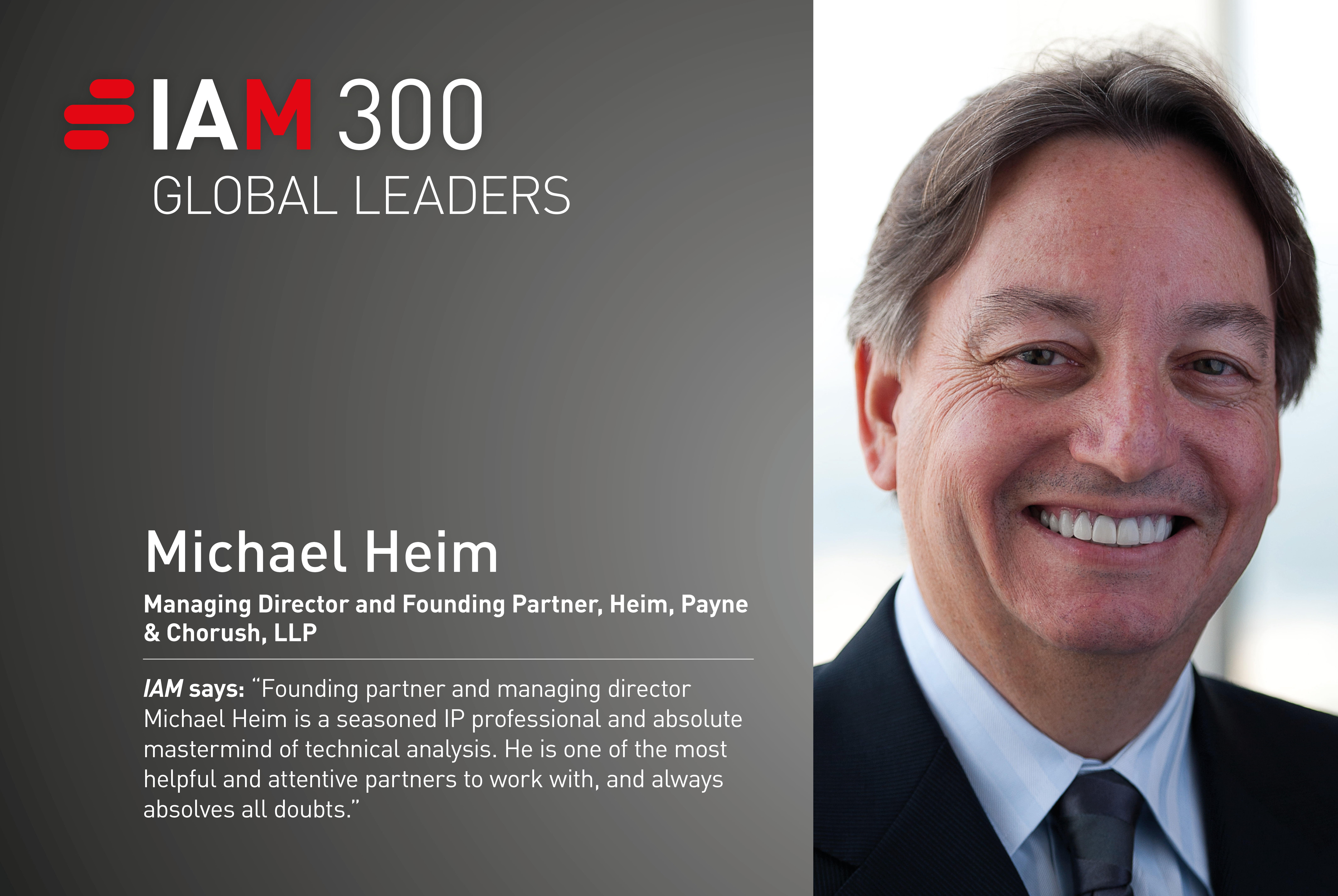Michael Heim
You have more than 30 years of litigation experience. What has been the highlight of your professional career so far and why?
The first thing that comes to mind is the inventors and clients that I have been fortunate enough to meet and represent during my career. My love of science and awe at the technological advances that have occurred in my lifetime makes me proud to represent innovators who have had a profound impact on the technology that we take for granted: advancements in WiFi technology, computer processing of media and graphics, and the hardware, software and distribution systems that provide streaming content. For many clients, I am their last hope of securing a financial return for their scientific contributions.
Another highlight is the group of attorneys that I have had the privilege of working with over the years. The patent field attracts some of the brightest minds in the legal industry, and I’ve had the good fortune to work with the best of them. The opportunity to be part of these trial teams has pushed me to improve in everything I do, and I am a better lawyer because of it.
They say that if you love what you do for a living, you never work a day in your life. These groups of people have turned my professional career into a highly enjoyable, rewarding experience, and I am thankful that I have been able to work with and represent such exceptional individuals.
What are your top tips for those in industries with a high level of tech convergence on how to communicate this new reality to personnel and incorporate it into their IP strategies?
My best advice for those in technology-driven fields is to look past the immediate horizon and project where you think technology will be, or where you want it to be, further down the road. Great innovators look past the issues we face now and anticipate future needs and problems that must be addressed.
You are known for your wealth of experience in developing innovative patent strategies. What is your advice for how to incorporate trade secrets into an IP portfolio?
Trade secret protection is absolutely critical and often overlooked. The current patent landscape is generally perceived to be hostile toward software innovations and other computer-related business practices. I recommend an IP strategy that focuses on trade secret protection for technological advances in this area. An IP strategist should consider whether trade secret protection provides better opportunities to safeguard this technology than the current US patent system.
As a former patent examiner at the USPTO, if you could change two things about the office’s examination process, what would they be and why?
I don’t typically get involved in regular patent prosecution, so I will focus on post-grant proceedings.
Two things badly need fixing. First, the burden applied by the USPTO is not high enough to justify overturning a prior decision to issue a patent. Close cases of patentability should not result in an unpatentability finding. The ability of a large corporation to pay a higher price and take away a patent from the owner seems fundamentally unjust, especially since most post-grant proceedings are only initiated against patent owners who have taken measures to commercialise or enforce a patent. This process breeds mistrust in the system and results in reduced innovation.
Second, the USPTO has proven itself ill equipped to judge the veracity of expert testimony and deposition evidence. This is unsurprising since administrative law judges rarely have experience acting as a judge of testimony.
It is common for expert reports to do nothing more than mirror the lawyer’s brief without much if any further technical insight. The USPTO must do a better job of disregarding such attorney arguments masquerading as competent expert opinions. The way that experts are used in post-grant proceedings does little, if anything, to advance the ball, and the USPTO should demand more.
What are the key characteristics that clients look for in a top-level IP attorney?
Clients want someone who understands their issues and who will work diligently on their behalf. But they also want a problem-solver and someone creative in advocating for them. Lastly, they want an attorney who can present their issues clearly and persuasively to a judge or jury.
Michael Heim
Managing Director and Founding Partner
[email protected]
Michael Heim is a nationally renowned trial lawyer who specialises in IP litigation and antitrust lawsuits for clients in various industries. He is well known for successfully handling high-stakes matters for some of the largest energy and technology firms in the world. Mr Heim is equally adept at representing individuals and smaller companies against industry behemoths. He also evaluates patent portfolios and develops strategies to enforce and license them.
